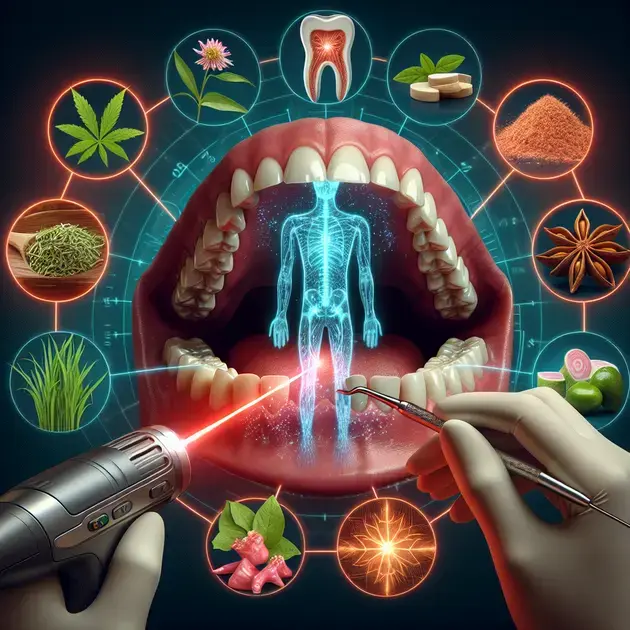Periodontitis is a common dental condition that affects millions of people worldwide. It is a serious gum infection that damages the soft tissue and destroys the bone that supports your teeth. In this comprehensive guide, we will explore the most effective medications for treating periodontitis and restoring your oral health.
Recent studies have shown that a combination of antibiotics and antimicrobial mouth rinses can significantly help in managing periodontitis. These medications work by reducing the number of bacteria in your mouth, thus preventing further damage to your gums and teeth. Understanding the importance of proper medication is crucial in effectively combating periodontitis and maintaining a healthy smile.

Effective Medication Options for Periodontitis
When it comes to treating periodontitis effectively, there are several medication options available. It’s essential to work closely with your dental healthcare provider to determine the best course of action for your specific condition. Here are some commonly prescribed medications for periodontitis:
1. Antibiotics:
Antibiotics are frequently used in the treatment of periodontitis to help control bacterial infections. They can be prescribed in pill form or as a mouth rinse. One popular antibiotic for periodontitis is doxycycline, which helps reduce inflammation and improve gum health. Your dentist will determine the appropriate type and duration of antibiotic treatment for your condition.
2. Antimicrobial Mouth Rinses:
Antimicrobial mouth rinses are another effective medication option for periodontitis. These rinses contain ingredients that help reduce bacteria in the mouth, promoting healthier gums. Chlorhexidine mouthwash is a common antimicrobial rinse used in the treatment of periodontitis. Your dentist may recommend using this mouthwash as part of your daily oral hygiene routine.
3. Pain Medication:
In some cases, over-the-counter or prescription pain medication may be necessary to manage discomfort associated with periodontitis. Nonsteroidal anti-inflammatory drugs (NSAIDs) like ibuprofen can help reduce pain and swelling. Your dentist can advise you on the proper dosage and usage of pain medication for your condition.
4. Periodontal Gels:
Periodontal gels are topical medications that can be applied directly to the gums to help reduce inflammation and promote healing. These gels often contain antibiotics or antimicrobial agents to target the bacteria causing the infection. Your dentist may recommend using a periodontal gel in conjunction with other treatments for better results.
5. Oral Probiotics:
Oral probiotics are a newer medication option that aims to restore the balance of beneficial bacteria in the mouth. These products contain live bacteria strains that can help combat harmful bacteria and support oral health. Your dentist may recommend incorporating oral probiotics into your daily routine to aid in the treatment of periodontitis.
The Role of Antibiotics and Antimicrobial Mouth Rinses
Antibiotics and antimicrobial mouth rinses play a crucial role in the treatment of periodontitis by targeting and controlling the bacterial infections that contribute to gum disease. Here’s how these medications help in combating periodontitis:
1. Antibiotics:
Antibiotics work by directly attacking the harmful bacteria in the mouth that cause gum inflammation and infection. They can help reduce the bacterial load, allowing the gums to heal and preventing further damage. Oral antibiotics are usually prescribed for a specific duration to maximize their effectiveness in treating periodontitis.
2. Antimicrobial Mouth Rinses:
Antimicrobial mouth rinses contain ingredients that can reach areas of the mouth that may be difficult to clean with regular brushing and flossing. These rinses help reduce the number of bacteria in the mouth, promoting a healthier oral environment. Incorporating an antimicrobial mouth rinse into your daily oral hygiene routine can aid in controlling gum disease and preventing its progression.

Understanding the Different Phases of Periodontitis Development
Periodontitis is a serious gum infection that damages the soft tissue and destroys the bone that supports your teeth. It typically progresses through several phases, starting with gingivitis, which is the initial stage of gum disease. In gingivitis, the gums become red, swollen, and bleed easily. If left untreated, gingivitis can progress to periodontitis.
In the early stages of periodontitis, the supporting bone and fibers that hold your teeth in place are damaged. This can lead to pockets forming between your teeth and gums, where bacteria can collect and cause further infection. As the disease progresses, these pockets deepen and more gum tissue and bone are destroyed.
Advanced periodontitis is the final stage of the disease, where the bone and fibers supporting your teeth are destroyed. This can cause your teeth to shift or loosen, and may eventually lead to tooth loss. It is crucial to seek treatment at the earliest signs of periodontitis to prevent the disease from advancing to this stage.
Regular dental check-ups and good oral hygiene habits are essential in preventing periodontitis. Brushing and flossing daily, along with professional dental cleanings, can help remove plaque and bacteria that contribute to gum disease. Understanding the different phases of periodontitis development can help you recognize the signs and symptoms early on, leading to prompt treatment and better outcomes for your oral health.
Remember, prevention is key when it comes to maintaining good oral health. By being proactive and seeking treatment at the first signs of gum disease, you can protect your smile and preserve your teeth for years to come.
The Link Between Systemic Health and Periodontitis Progression
Research has shown that there is a strong connection between systemic health and the progression of periodontitis. Systemic health refers to the overall health of your body, including factors such as diabetes, heart disease, and immune function. Studies have found that individuals with certain systemic health conditions may be at a higher risk for developing periodontitis and experiencing more severe forms of the disease.
For example, individuals with diabetes are more susceptible to gum disease due to their body’s reduced ability to fight off infections. Similarly, people with heart disease may have an increased risk of developing periodontitis, as inflammation in the mouth can exacerbate existing heart conditions. Understanding these links between systemic health and periodontitis progression is crucial in managing the disease and preventing further complications.
It is important for individuals with systemic health conditions to communicate with their healthcare providers and dentists about their medical history and any symptoms of gum disease they may be experiencing. By addressing systemic health concerns and managing them effectively, you can reduce the risk of periodontitis progression and maintain better overall oral health.
Additionally, maintaining a healthy lifestyle, including a balanced diet, regular exercise, and proper oral hygiene, can help support both your systemic health and your oral health. By taking a holistic approach to wellness, you can reduce your risk of developing periodontitis and promote a healthier smile for years to come.
Remember, your oral health is an integral part of your overall health, and taking care of your gums and teeth can have a positive impact on your systemic well-being. By understanding the link between systemic health and periodontitis progression, you can take proactive steps to protect your oral and overall health.
Exploring Alternative Treatment Approaches for Periodontitis Symptoms
While traditional treatment methods for periodontitis often involve scaling and root planing, surgery, or prescribed medications, there are also alternative approaches that individuals can explore to manage and alleviate symptoms of gum disease. These alternative treatments may complement traditional methods or be used as standalone therapies, depending on the severity of the condition and individual preferences.
One alternative treatment for periodontitis is laser therapy, which involves using focused light energy to remove inflamed gum tissue and kill bacteria around the gums. This minimally invasive procedure can help reduce pocket depths and promote gum tissue regeneration, leading to improved oral health outcomes for some individuals.
Naturopathic remedies, such as herbal supplements, essential oils, and acupuncture, have also been explored as alternative treatments for periodontitis symptoms. These natural therapies focus on supporting the body’s ability to heal and fight infection, often in conjunction with traditional dental care practices.
Diet and nutrition play a crucial role in gum health, and some individuals may benefit from dietary changes or nutritional supplements to support their periodontal health. Foods rich in vitamins C and D, as well as omega-3 fatty acids, have been linked to improved gum health and may help reduce inflammation associated with gum disease.
It is important to consult with a healthcare provider or qualified dental professional before pursuing alternative treatment approaches for periodontitis symptoms. They can help assess your individual needs, provide guidance on potential benefits and risks, and ensure that any alternative therapies are safe and effective for your specific condition.
By exploring alternative treatment approaches for periodontitis symptoms and working with healthcare professionals to develop a personalized treatment plan, individuals can take a proactive approach to managing their gum health and improving their overall well-being.
Conclusion
Understanding the different phases of periodontitis development is crucial for early detection and effective treatment. From gingivitis to advanced periodontitis, each stage represents a progression of the disease that can result in severe consequences if left untreated. By recognizing the signs and symptoms early on, individuals can seek prompt dental care to prevent further damage to the gums and supporting structures of the teeth.
The link between systemic health and periodontitis progression highlights the importance of overall well-being in managing gum disease. Individuals with conditions such as diabetes or heart disease need to be especially vigilant, as these systemic health issues can contribute to the severity of periodontitis. By addressing systemic health concerns and maintaining a healthy lifestyle, individuals can reduce the risk of periodontitis advancement and support their oral health in the long term.
Exploring alternative treatment approaches for periodontitis symptoms offers individuals additional options to complement traditional methods. Laser therapy, naturopathic remedies, and dietary changes can help alleviate gum disease symptoms and promote gum tissue regeneration. Consulting with healthcare professionals is essential to determine the most suitable treatment plan for the individual, ensuring that alternative therapies are safe and effective for their specific condition.



